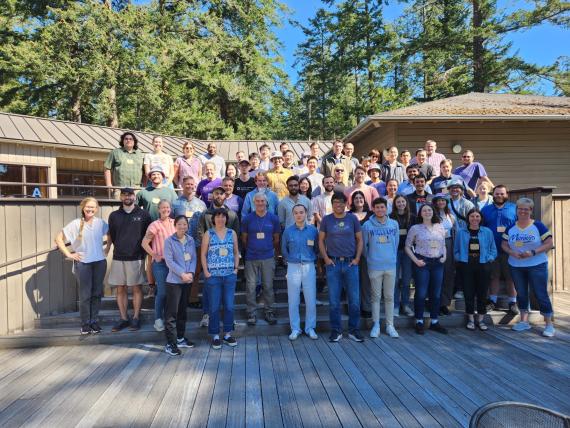The National Science Foundation (NSF) announced in July that the University of Washington’s Molecular Engineering and Materials Center (MEM·C) and Center for Integration of Modern Optoelectronic Materials on Demand (IMOD), in collaboration with partner institutions, have been selected for four Partnerships for Research and Education in Materials (PREM) awards totaling $13.6 million. The focus of these PREM initiatives is to increase participation and access to materials science resources, education, training, and career opportunities at minority-serving institutions.
Only 11 institutions nationwide received funding in the latest round of PREM awards, placing the UW and its partners among a distinguished group of institutions.
“These PREM awards, involving more than two dozen researchers across the University of Washington, are a testament to the interdisciplinary strength of the University and the groundbreaking work of our faculty,” says Xiaosong Li, associate dean for research in the UW College of Arts & Sciences. “With this funding, we can foster even more innovative research and expand participation in materials science.”
PREM Partnerships with MEM·C
The University of Hawai’i at Mānoa (UHM) and the University of Central Florida (UCF) are the primary awardees of six-year PREM grants totaling $4.2 million each, with MEM·C participating as a subawardee in both projects.
At UCF, the PREM award will support research at the Center for Quantum Material Innovations and Educational Excellence (CQ-MIEE), focusing on quantum material synthesis for energy-efficient communications, novel chemical applications, and the development of new medicines. Each year, MEM·C will host undergraduate and graduate students from UCF for summer research opportunities at the UW alongside UW students and faculty. Ting Cao, assistant professor of materials science and engineering, will serve as the UW’s CQ-MIEE Director.
At UHM, the PREM award will fund research at the Materials Research and Education Consortium (MRE-C), focusing on clean energy and sustainability solutions for challenges specific to Hawaii, including reliance on imported fuels, resource and waste management, soil erosion, and ocean contamination—issues that are being exacerbated by climate change. Each year, MEM·C will host visiting students from UHM to participate in summer research programs at the UW. Lilo Pozzo, professor of chemical engineering and Boeing-Roundhill Endowed Professor for Excellence in Engineering, will serve as the UW’s MRE-C Director.
Other UW faculty members involved with one or both of these initiatives include Daniel Gamelin, Xiaosong Li, Andrea Carroll, Brandi Cossairt, Alexandra Velian, Jim De Yoreo, Dianne Xiao, and Stefan Stoll from the Department of Chemistry; Jiun-Haw Chu and Matthew Yankowitz from the Department of Physics; Juan Carlos Idrobo, Scott Dunham, and Eleftheria Roumeli from the Department of Materials Science and Engineering; and Julie Rorrer, Zach Sherman, and Vincent Holmberg from the Department of Chemical Engineering.
PREM Partnerships with IMOD
Other PREM collaborations, both involving IMOD, are with Fort Lewis College, Norfolk State University, and the University of California Merced.
The Partnership for Education and Advancement of Quantum and nano-Sciences (PEAQS) PREM award connects Fort Lewis College (FLC), Norfolk State University (NSU), and IMOD by providing $4.2M to support undergraduate and graduate students in their research and by providing access to opportunities and resources. FLC and NSU will partner with IMOD to draw upon the quantum optoelectronic expertise and programming within the Center to better prepare their students to enter the STEM workforce, while also establishing collaborative connections for joint research projects. This PREM will not only support student research in quantum-level material properties, with potential applications in materials fabrication and nanoscale devices, but also provide access to professional development, engagement with IMOD industry partners, mentoring, and career development.
The University of California Merced will receive $1 million in PREM seed funding for its Venture for Innovation in Self-assembly and Integration of Optoelectronic Nanostructures (VISION) program, to develop a new partnership between VISION and IMOD. VISION aims to cultivate student potential in STEM through enriched research opportunities, scientific collaboration, pedagogical development, and mentoring and seeks to broaden nano- and quantum materials literacy at all educational levels. Institutions receiving PREM seed funding can compete for full PREM awards in the next award cycle.
UW faculty members involved with one or both IMOD initiatives include Brandi Cossairt, Arka Majumdar, Daniel Gamelin, David Ginger, and J. Devin MacKenzie.
The UW portion of all four PREM awards will be administered through the UW Department of Chemistry.
For more information, contact David Ginger at dginger@uw.edu or Daniel Gamelin at gamelin@uw.edu. The National Science Foundation (NSF) Partnerships for Research and Education in Materials (PREM) award abstracts are described on the NSF award pages linked below:
Center for Quantum Material Innovations and Educational Excellence (CQ-MIEE): DMR-2424976
Materials Research and Education Consortium (MRE-C): DMR-2121848
Partnership for Education and Advancement of Quantum and nano-Sciences (PEAQS): DMR-2424811
Venture for Innovation in Self-assembly and Integration of Optoelectronic Nanostructures (VISION): DMR-2425230
The Center for Integration of Modern Optoelectronic Materials on Demand (IMOD) is a National Science Foundation (NSF) Science and Technology Center (STC) supported by the National Science Foundation under Award Number DMR-2019444.
The Molecular Engineering Materials Center (MEM-C) is a National Science Foundation (NSF) Materials Research Science and Engineering Centers (MRSEC) supported by the National Science Foundation under Award Number DMR-2308979.
For more on the UCF/UW PREM partnership, visit UCF Today.
